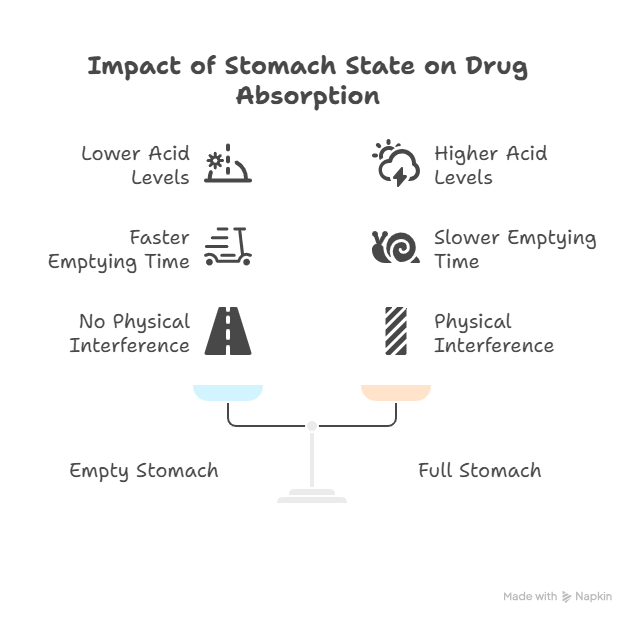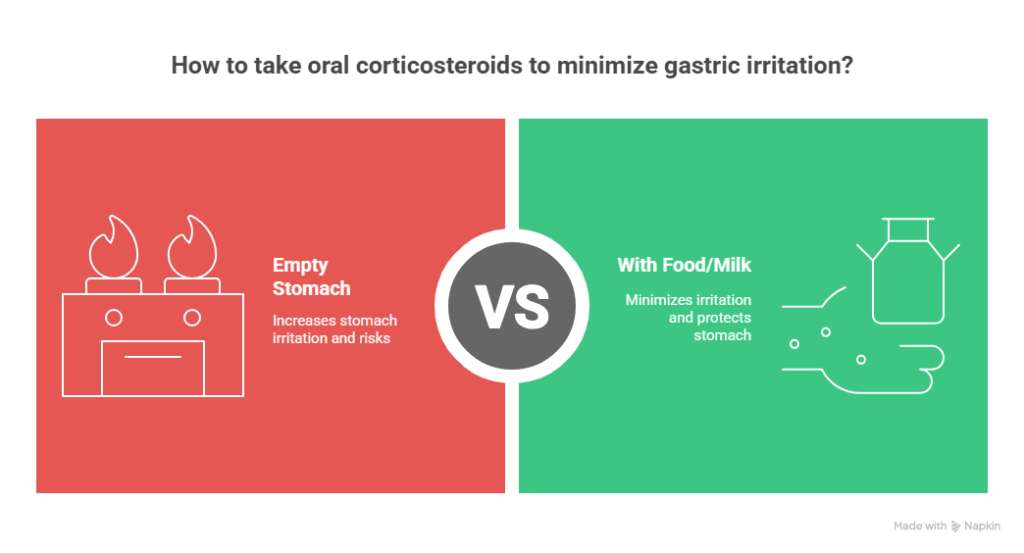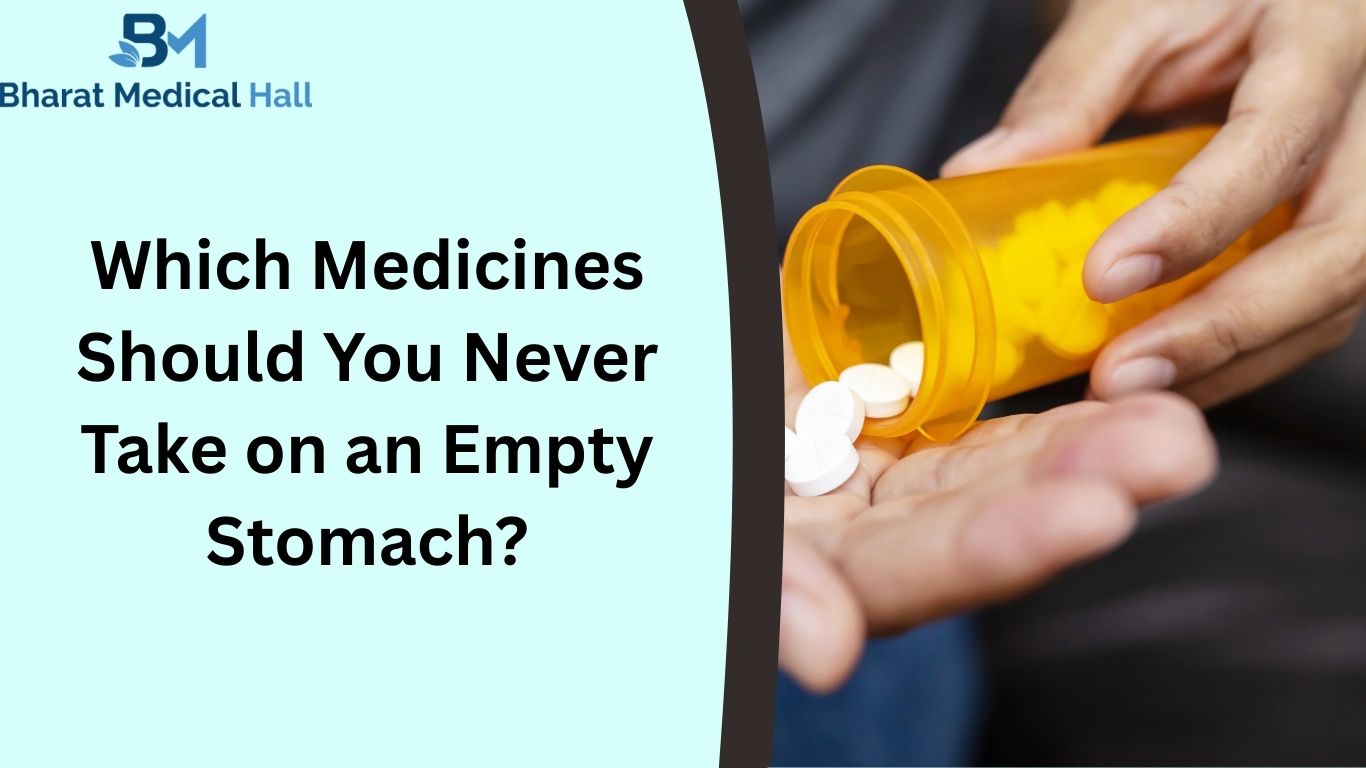We’ve all been there: a prescription in hand, a list of instructions, and the simple act of swallowing a pill. It seems straightforward, doesn’t it? But sometimes, the most critical part of taking medicine isn’t just what you take, or how much, but when you take it, especially in relation to food. You might have seen instructions like “take with food,” “take on an empty stomach,” or “take before meals,” and perhaps, like many of us, given them a passing glance. However, ignoring these instructions can transform a helpful remedy into a harmful one. That’s why today, we’re diving deep into a truly important question: Which Medicines Should You Never Take on an Empty Stomach?
Understanding this isn’t just about avoiding a little stomach upset; it’s about protecting your digestive system, ensuring the medication works as intended, and preventing potentially serious side effects. Our stomachs are sensitive environments, and the presence or absence of food can drastically change how a medicine interacts with our body. Let’s explore the science behind this vital aspect of medication management.
Understanding the “Empty Stomach” Phenomenon: More Than Just Hunger
First, let’s clarify what “empty stomach” actually means in the world of medicine. Generally, it refers to taking medication:
- At least one hour before eating a meal.
- At least two hours after eating a meal.
This timeframe ensures that your stomach has minimal food content, allowing the medication to be absorbed quickly and without interference from food particles or digestive processes.
But why does this matter so much? The stomach is a highly acidic organ designed to break down food. Its environment changes dramatically depending on whether you’ve just eaten or not.

- Acid Levels: When your stomach is empty, its acid levels are generally lower and more stable. After a meal, especially a large one, your stomach churns out more acid to aid digestion, significantly altering the pH.
- Gastric Emptying Time: Food takes time to move from your stomach to your small intestine (where most drug absorption occurs). A large, fatty meal can slow down gastric emptying considerably, sometimes for several hours. This delay can impact how quickly a drug becomes available to your body.
- Physical Presence of Food: Food physically occupies space and can literally block the drug from coming into contact with the stomach lining or intestinal walls where absorption takes place. Certain food components can also bind to drugs, forming complexes that are not easily absorbed.
These factors combined mean that the difference between taking a medicine with food versus on an empty stomach can be the difference between effective treatment and ineffective, or even harmful, consequences. This is the very essence of understanding Which Medicines Should You Never Take on an Empty Stomach?
Get Health Monitoring Devices & Medicines in Baripada
Buy Medicines, BP machines, oximeters, thermometers & more. Quick delivery to your home in Baripada.
Contact NowWhy Food Matters: How Food Can Influence Medication
Food isn’t just fuel; it’s a powerful variable in how your body interacts with medications. It can influence drugs in several key ways:
- Stomach Protection (Buffering Effect): Many medications are irritating to the delicate lining of the stomach. Food acts as a physical buffer, diluting the drug and providing a protective layer that minimizes direct contact with the stomach wall. This reduces the risk of irritation, heartburn, nausea, and more serious issues like ulcers or bleeding.
- Absorption Enhancement: For some drugs, the presence of food, especially fats, is crucial for their proper absorption into the bloodstream. These drugs might be poorly absorbed without food, rendering them less effective.
- Absorption Hindrance: Conversely, for other medications, food (or specific components of food like calcium or iron) can interfere with their absorption, reducing the amount of drug that actually enters your system. This is why some drugs must be taken on an empty stomach for maximum effectiveness.
- Side Effect Reduction: Even if food doesn’t directly impact absorption, taking a medication with food can significantly reduce common side effects like nausea, vomiting, or stomach cramps, making the medication more tolerable.
- Blood Sugar Management: For diabetes medications, food timing is critical to synchronize the drug’s action with your body’s glucose levels, preventing dangerous spikes or drops in blood sugar.
It’s clear that “take with food” is not just a suggestion – it’s a critical instruction for your safety and the medicine’s efficacy. Let’s now explore the specific categories and examples of Which Medicines Should You Never Take on an Empty Stomach?
Get Health Monitoring Devices & Medicines in Baripada
Buy Medicines, BP machines, oximeters, thermometers & more. Quick delivery to your home in Baripada.
Contact NowKey Categories of Medicines to Avoid on an Empty Stomach (And Why!)
Here’s a detailed look at the types of medications that absolutely require food to be taken safely and effectively:
1. NSAIDs (Non-Steroidal Anti-Inflammatory Drugs)
- Examples: Ibuprofen (e.g., Brufen, Advil), Naproxen (e.g., Naprosyn, Aleve), Aspirin (for pain relief, not low-dose cardio protection), Diclofenac (e.g., Voveran, Volini), Etoricoxib (e.g., Arcoxia).
- Why You Should NEVER Take Them on an Empty Stomach: NSAIDs are notorious for causing gastrointestinal irritation. They work by blocking enzymes called cyclooxygenases (COX), which produce prostaglandins. While blocking certain prostaglandins reduces pain and inflammation, COX-1 prostaglandins also play a vital role in protecting the stomach lining by promoting mucus and bicarbonate secretion. When you take NSAIDs on an empty stomach, they directly irritate the stomach lining and simultaneously remove its natural protective barrier, creating a dangerous combination.
- Risks: Taking NSAIDs on an empty stomach significantly increases the risk of:
- Heartburn and indigestion
- Nausea and vomiting
- Stomach ulcers
- Gastrointestinal bleeding, which can be life-threatening.
- Best Practice: Always take NSAIDs with food or milk. A full glass of water can also help dilute the drug and prevent direct contact with the stomach lining. If stomach upset is still an issue, your doctor might recommend an antacid or a proton pump inhibitor (PPI) along with the NSAID.
2. Oral Corticosteroids

- Examples: Prednisolone, Prednisone, Dexamethasone, Methylprednisolone.
- Why You Should NEVER Take Them on an Empty Stomach: Corticosteroids are powerful anti-inflammatory and immunosuppressive drugs. They are highly effective but are also known to be very irritating to the stomach lining, increasing acid production and weakening the stomach’s protective barrier.
- Risks: Taking them on an empty stomach can lead to:
- Severe stomach pain and discomfort
- Nausea and vomiting
- Heartburn
- Development or worsening of peptic ulcers.
- Best Practice: Always take oral corticosteroids with food or milk to minimize gastric irritation. Your doctor might also prescribe a stomach-protective medication, especially for long-term use.
3. Certain Antibiotics
- Examples:
- Metronidazole (e.g., Flagyl): Known to cause severe nausea and vomiting if taken on an empty stomach.
- Nitrofurantoin (e.g., Macrodantin, Macrobid): Used for urinary tract infections, it can cause significant stomach upset and nausea. Food also enhances its absorption.
- Some Macrolides (e.g., Erythromycin): While newer macrolides like Azithromycin are often better tolerated, some older ones can cause significant GI distress if taken without food.
- Oral Antifungals (e.g., Griseofulvin, some Azoles like Ketoconazole): Often require a fatty meal for optimal absorption and to reduce GI side effects.
- Metronidazole (e.g., Flagyl): Known to cause severe nausea and vomiting if taken on an empty stomach.
- Why You Should NEVER Take Them on an Empty Stomach: Many antibiotics can directly irritate the stomach lining or are poorly absorbed without food. The severe nausea and vomiting induced can lead to missed doses or the body expelling the medication before it’s fully absorbed, reducing its effectiveness against the infection.
- Risks:
- Severe gastrointestinal distress (nausea, vomiting, abdominal pain).
- Reduced drug absorption, leading to ineffective treatment and potential antibiotic resistance.
- Best Practice: Always check the specific instructions for each antibiotic. While some antibiotics must be taken on an empty stomach (e.g., Tetracyclines, Ciprofloxacin, Levofloxacin – to avoid interaction with calcium/iron in food), many others are best taken with food to improve tolerance and/or absorption. If the label says “take with food,” don’t skip it!
Get Health Monitoring Devices & Medicines in Baripada
Buy Medicines, BP machines, oximeters, thermometers & more. Quick delivery to your home in Baripada.
Contact Now4. Oral Diabetes Medications (Certain Types)
- Examples:
- Metformin (e.g., Glycomet, Obimet): A very common drug for Type 2 diabetes.
- Sulfonylureas (e.g., Glibenclamide, Glipizide, Glimepiride): Another class of diabetes drugs.
- Why You Should NEVER Take Them on an Empty Stomach: These medications are designed to lower blood sugar. Taking them without having food to digest can lead to dangerous drops in blood sugar levels (hypoglycemia). Metformin, specifically, is known to cause significant gastrointestinal side effects (nausea, diarrhea, stomach upset) that are greatly reduced when taken with food. Sulfonylureas stimulate insulin release, and without food to process, the excess insulin can drive blood sugar too low.
- Risks:
- Hypoglycemia (low blood sugar): Symptoms include dizziness, shakiness, confusion, sweating, rapid heartbeat, and in severe cases, seizures or unconsciousness. This is a critical answer to Which Medicines Should You Never Take on an Empty Stomach? for diabetics.
- Severe gastrointestinal upset.
- Best Practice: Always take these medications with or immediately after a meal, as specifically instructed by your doctor or pharmacist. The timing is crucial to synchronize the drug’s action with glucose absorption from your food.
5. Iron Supplements
- Examples: Ferrous Sulfate, Ferrous Gluconate, Ferrous Fumarate.
- Why You Should NEVER Take Them on an Empty Stomach: Iron supplements are known for causing considerable gastrointestinal irritation, including nausea, constipation, stomach cramps, and heartburn.
- Risks:
- Severe gastrointestinal upset, making adherence to treatment difficult.
- Heartburn.
- Best Practice: Take iron supplements with food to minimize side effects. However, be aware that certain foods (like dairy products, tea, coffee, and whole grains) can inhibit iron absorption. Taking iron with a source of Vitamin C (like orange juice) can actually enhance its absorption. Your doctor or pharmacist can guide you on the best timing and food choices.
6. Certain Painkillers that are Combination Drugs
- Many over-the-counter and prescription pain relievers are combinations of different drugs. For example, some may combine paracetamol with an NSAID, or contain ingredients that can cause drowsiness or stomach upset.
- Why You Should NEVER Take Them on an Empty Stomach: If a combination painkiller contains an NSAID or another stomach-irritating ingredient, all the warnings about taking NSAIDs on an empty stomach apply.
- Risks: Increased risk of GI irritation and other side effects due to synergistic effects of combined ingredients.
- Best Practice: Always read the label of combination drugs carefully to identify all active ingredients and follow specific food instructions. When in doubt, take them with food.
Get Health Monitoring Devices & Medicines in Baripada
Buy Medicines, BP machines, oximeters, thermometers & more. Quick delivery to your home in Baripada.
Contact NowUnderstanding the Fine Print: “Empty Stomach” vs. “With Food” vs. “Before Meals” vs. “After Meals”
The instructions on your medication label are precise, and understanding the nuances is key to knowing Which Medicines Should You Never Take on an Empty Stomach? or when to take them with food.
- “Empty Stomach” (usually 1 hour before or 2 hours after a meal): This instruction is given when food would significantly interfere with the drug’s absorption, making it less effective. Examples include certain thyroid hormones (like levothyroxine, which needs very consistent absorption), some acid reducers (e.g., proton pump inhibitors like Omeprazole, which are activated by stomach acid and are best taken before the first meal), and some antibiotics.
- “With Food” (take immediately before, during, or just after a meal): This is the crucial instruction for drugs that can irritate your stomach (like NSAIDs, corticosteroids) or drugs whose absorption is enhanced by food (e.g., certain antifungals, some fat-soluble vitamins). The food provides a buffer and/or helps with absorption.
- “Before Meals” (typically 15-30 minutes before eating): This is often for medications that need to be active in your system by the time food arrives, such as some diabetes medications (sulfonylureas) that stimulate insulin release to process the incoming meal, or certain digestive enzymes.
- “After Meals” (within 30 minutes of eating): This instruction is similar to “with food” and is usually given for drugs that are irritating to the stomach or whose absorption is improved by the presence of food.
The Critical Role of Your Pharmacist and Doctor
Navigating medication instructions can feel overwhelming, especially if you’re taking multiple drugs. This is precisely where your doctor and pharmacist become your invaluable guides. They are the experts who can tell you definitively Which Medicines Should You Never Take on an Empty Stomach? for your specific needs.
- Your Doctor: When prescribing, your doctor should ideally inform you about important food-drug interactions. Don’t hesitate to ask clarifying questions during your appointment.
- Your Pharmacist: Your pharmacist is a medication expert. When you pick up a prescription, they are trained to provide counseling on how to take the medication, including specific instructions regarding food. They can explain why certain instructions are given and clarify any doubts you might have.
- Read the Medication Leaflet: Every medicine comes with a patient information leaflet (PIL) or package insert. This document contains detailed instructions on how and when to take the medication, as well as potential side effects and interactions. Always take a few minutes to read it thoroughly.
Never, ever hesitate to ask if you’re unsure. A simple question can prevent serious complications.
Get Health Monitoring Devices & Medicines in Baripada
Buy Medicines, BP machines, oximeters, thermometers & more. Quick delivery to your home in Baripada.
Contact NowConsequences of Ignoring “With Food” Instructions
Ignoring the advice on Which Medicines Should You Never Take on an Empty Stomach? can lead to several negative outcomes:
- Reduced Drug Effectiveness: If food is required for optimal absorption, taking the drug on an empty stomach means less of the medication gets into your bloodstream, making it less effective in treating your condition.
- Increased Side Effects: For irritating drugs, taking them on an empty stomach significantly increases the risk of nausea, vomiting, stomach pain, heartburn, and more severe issues like ulcers or internal bleeding.
- Dangerous Blood Sugar Fluctuations: For certain diabetes medications, taking them without food can lead to a dangerously low blood sugar level (hypoglycemia), which requires immediate attention.
- Organ Damage: Chronic irritation from certain drugs on an empty stomach can contribute to long-term damage to the stomach lining, liver, or kidneys.
- Poor Treatment Adherence: If a medication consistently makes you feel unwell due to improper timing, you might be tempted to stop taking it, compromising your health outcome.
Conclusion: Empowering Your Medication Journey
The simple act of taking a pill is far from simple when you consider the intricate dance between your body, the medicine, and your diet. Understanding Which Medicines Should You Never Take on an Empty Stomach? is a fundamental piece of medication literacy that can profoundly impact your health and safety. Always remember that the instructions on your medication label are there for a reason, and adhering to them is a non-negotiable part of effective treatment. When in doubt, always ask!
For reliable access to your medications and expert advice on how to take them safely, you can always trust Bharat Medical Hall. Their dedicated team of professionals is committed to guiding you through your medication journey, ensuring you have all the information you need for optimal health outcomes. Don’t hesitate to visit https://www.bharatmedicalhall.com/ or speak with their pharmacists to get clear instructions and peace of mind about your prescriptions. At Bharat Medical Hall, your well-being is their top priority.
Get Health Monitoring Devices & Medicines in Baripada
Buy Medicines, BP machines, oximeters, thermometers & more. Quick delivery to your home in Baripada.
Contact NowFAQs
What does “empty stomach” actually mean for taking medication?
Taking medication on an “empty stomach” generally means consuming it at least one hour before a meal or at least two hours after eating a meal, ensuring minimal food content in your stomach for optimal drug absorption or reduced interference.
Why can taking NSAIDs like Ibuprofen on an empty stomach be dangerous?
Taking NSAIDs on an empty stomach is dangerous because these medications directly irritate the stomach lining and also inhibit the body’s natural protective mechanisms in the stomach, significantly increasing the risk of heartburn, ulcers, and potentially life-threatening gastrointestinal bleeding.
Can taking antibiotics without food reduce their effectiveness, or just cause stomach upset?
For many antibiotics, taking them without food can cause severe nausea, vomiting, or stomach cramps; in some cases, it can also hinder the drug’s absorption, thereby reducing its effectiveness in treating the infection and potentially contributing to antibiotic resistance.
If a medicine says “take with food,” does that mean any amount of food, or a proper meal?
When a medicine says “take with food,” it typically means taking it with a proper meal or at least a substantial snack, as the food helps to buffer the stomach irritation or aids in the drug’s absorption more effectively than just a small bite.
What are the risks for diabetics if they take their oral medication without eating as instructed?
For diabetics, taking oral diabetes medications without eating as instructed can lead to a dangerous drop in blood sugar levels, known as hypoglycemia, which can cause symptoms like dizziness, shakiness, confusion, and in severe cases, seizures or loss of consciousness.
Who should I ask if I am unsure about how to take my medication concerning food?
If you are ever unsure about how to take your medication for food, you should always ask your prescribing doctor or, more immediately and commonly, consult with your pharmacist, as they are experts in medication administration and can provide clear, personalized instructions.







